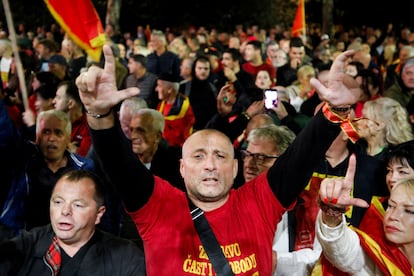Montenegro, an EU hopeful, to vote on a new government backed by anti-Western and pro-Russian groups
A centrist coalition that advocates the small Balkan country joining the European Union won early parliamentary elections in June, but without enough support to form a government on its own

After months of political bickering, the parliament in NATO member and EU candidate Montenegro is set to vote Monday on a proposed new government that will hinge on support from pro-Russian and anti-Western groups.
A recently formed centrist “Europe Now” coalition that advocates the small Balkan country joining the European Union won early parliamentary elections in June, but without enough support to form a government on its own.
Following months of negotiations, the winning coalition received backing from staunchly anti-Western groups under the condition that one of their leaders, Andrija Mandic, was elected as the speaker of parliament — an influential political position.
The coalition agreement also includes the condition that the pro-Serbian groups will join the government within a year with their government ministries. Mandic had called for close ties with Russia rather than the EU, criticized Montenegro’s NATO membership and was against splitting from much bigger Serbia in a referendum in 2006.
Mandic, who was elected on Monday, said that he is ready to “send some new messages,” forget what he has advocated in the past and focus on the future of the country. “My mission is to reconcile the divisions in Montenegro, and that’s how I’ll behave,” he said.
Opposition officials claimed that this was a “black day” for Montenegro and its hopes of joining the EU anytime soon. Hundreds of opposition supporters waving Montenegrin flags staged a protest in front of the parliament building in the capital against the new government.
The 81-seat parliament also planned to hold a vote on a new cabinet led by Prime Minister Milojko Spajic of the “Europe Now” movement and his proposed cabinet ministers, a formality after Mandic was elected on Monday.
U.S. and EU officials have suggested that Montenegro, once considered the Balkan frontrunner for EU membership, should avoid introducing an anti-NATO and anti-Western political party into its coalition if it wants to join the bloc.
European Commission President Ursula von der Leyen is scheduled to hold talks with the new Montenegrin prime minister on Tuesday in the capital, Podgorica, as a part of her tour of the Western Balkan states seeking EU membership.
The election in June was Montenegro’s first in more than 30 years that did not feature Milo Djukanovic, who had served almost continuously as either prime minister or president since 2001. Djukanovic, who led Montenegro into NATO in 2017, lost a presidential election in April and has taken a back seat in national politics.
The Democratic Party of Socialists, the pro-Western party formerly led by Djukanovic, has experienced a decline in popularity after three decades of dominance and has new leadership that was looking for a chance to make a comeback.
Sign up for our weekly newsletter to get more English-language news coverage from EL PAÍS USA Edition
Tu suscripción se está usando en otro dispositivo
¿Quieres añadir otro usuario a tu suscripción?
Si continúas leyendo en este dispositivo, no se podrá leer en el otro.
FlechaTu suscripción se está usando en otro dispositivo y solo puedes acceder a EL PAÍS desde un dispositivo a la vez.
Si quieres compartir tu cuenta, cambia tu suscripción a la modalidad Premium, así podrás añadir otro usuario. Cada uno accederá con su propia cuenta de email, lo que os permitirá personalizar vuestra experiencia en EL PAÍS.
¿Tienes una suscripción de empresa? Accede aquí para contratar más cuentas.
En el caso de no saber quién está usando tu cuenta, te recomendamos cambiar tu contraseña aquí.
Si decides continuar compartiendo tu cuenta, este mensaje se mostrará en tu dispositivo y en el de la otra persona que está usando tu cuenta de forma indefinida, afectando a tu experiencia de lectura. Puedes consultar aquí los términos y condiciones de la suscripción digital.








































